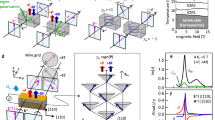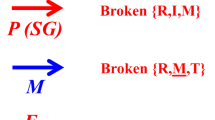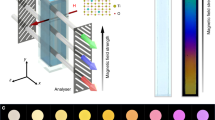Abstract
IT is well known that salts of cerium and other rare earths exhibit in aqueous solution a Faraday effect or magnetic gyration of light in the opposite sense to that shown by the great majority of fluids. The phenomenon has been explained by Ladenburg, Becquerel, and others as an effect connected with the paramagnetism of the ions and their orientation by the magnetic field. The study of magnetic gyration in paramagnetic substances generally therefore possesses great interest. Incidentally, also, the question arises if, as has been suggested by Ladenburg, the paramagnetic ions are orientated by the field, whether the solutions should not exhibit magnetic birefringence when observed in a direction transverse to the field. Investigations made on both these points have yielded very interesting results.
This is a preview of subscription content, access via your institution
Access options
Subscribe to this journal
Receive 51 print issues and online access
$199.00 per year
only $3.90 per issue
Buy this article
- Purchase on Springer Link
- Instant access to full article PDF
Prices may be subject to local taxes which are calculated during checkout
Similar content being viewed by others
Author information
Authors and Affiliations
Rights and permissions
About this article
Cite this article
RAMAN, C., CHINCHALKAR, S. A New Type of Magnetic Birefringence. Nature 128, 758–759 (1931). https://doi.org/10.1038/128758b0
Issue Date:
DOI: https://doi.org/10.1038/128758b0
This article is cited by
Comments
By submitting a comment you agree to abide by our Terms and Community Guidelines. If you find something abusive or that does not comply with our terms or guidelines please flag it as inappropriate.



